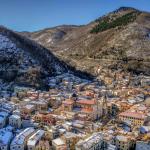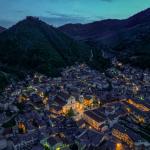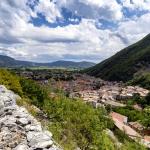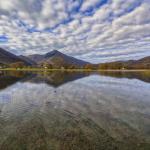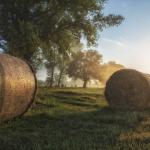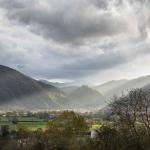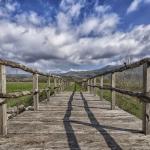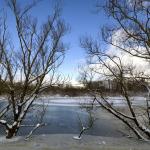The Municipality of Volturara Irpina is located in the area of the Picentini Mountains Park, on the slopes of Mount Terminio, in an extraordinary natural basin. It's a town with 3,183 inhabitants, located 667 metres above sea level, at 23 km from Avellino. The territory extends for 32.42 sq km and the adjoining municipalities are: Castelvetere sul Calore, Chiusano di San Domenico, Montella, Montemarano, Salza Irpina, Santo Stefano del Sole, Serino and Sorbo Serpico.
The etymology of the name would seem to come from the original Etruscan base vel - "high ground", but also from Utur, which in Oscan-Samnite means "stagnant water", with the Latin suffix "ali". The inhabitants are called Volturaresi and Saint Nicholas of Bari is their patron.
PLACES OF INTEREST
- Piana del Dragone (Dragon’s Plain) - Extraordinary hydrographic basin (SIC) that collects rainwater and that of the springs, making them flow into the Bocca del Dragone (Dragon’s Mouth), a natural sinkhole on a cataclastic area originating from a fault: a very interesting naturalistic place, with a central lake and equipped areas
- Ethnographic Museum of Piana del Dragone - it preserves a remarkable cultural heritage of the peasant and artisan civilization, telling the history and traditions of the Volturara people
- Church of San Nicola (Saint Nicholas) - Mother Church located in the main square, it probably dates back to the 16th century as the first building; its bell tower has the peculiarity of being slightly inclined
- Via Ferratas and Climbing Routes - Three sport climbing routes, easily interconnected and of varying difficulty, which are located along the mountain overlooking the historic centre
- Ruins of the Saint Michael's Castle - Ruins of the medieval castle, currently affected by a restoration project, which was built during the Norman domination and located at the highest point of the town
- CAI path - "The high route of Picentini Mountains" from Volturara Irpina to Campolaspierto, passing through the Terminio at 1,806 meters above sea level
- Other - Church of Sacro Cuore di Gesù (Sacred Heart of Jesus), Sanctuary of S. Michele Arcangelo (Saint Michael the Archangel), Church of the Immacolata Concezione (Immaculate conception), Church of S. Vito Martire (Saint Vitus the Martyr), Masucci Palace
EVENTS
- Quarantino Bean and Potato Festival - Important food and wine and cultural event with many visitors, characterized by typical local products, music, guided tours and food and wine stands
- Chestnut, Truffle and Porcini Mushroom Feast - Food and wine event organized by the municipal administration and the Pro Loco, scheduled for October
- Feast of Saint Anthony - Religious celebrations that take place from the 27th to the 30th of July
- Madonna della Piana Feast - Religious event that takes place on the 23rd and 24th of August
TYPICAL FOOD AND PRODUCTS
- Volturara Irpina bean PAT - Small and irregular, typical of the Volturarese area, ash-white in colour, with a barely visible eye and a very thin skin; still today it's the product of a totally manual cultivation
- Volturara Potato - Cultivated without the need for irrigation, as the soils of the Volturara catchment area are already very humid: it's harvested at the end of September and it's a product with a unique flavour
- Caciocavallo podolico dei Monti Picentini PAT - Tasty and rare cheese aged up to 6 months, raw, hard and spun curd, particularly valuable
- Montella Chestnut PGI - Produced from seeds with white pulp, crunchy and with a pleasant sweet taste, it has high characteristics of shelf life, flavour and fragrance, and it's considered among the best chestnuts produced in Italy
- Cocozza, fasuli e patane - Pumpkin, beans and potatoes is a typical local dish, whose origins are linked to the peasant culture of the area
- Turnips and Potatoes - Ancient recipe typical of peasant food culture, for a poor and easy-to-make dish
- Carne 'e puorco co 'e pepacchie e patane - Traditional dish for the cold periods that uses pork, potatoes and pickled peppers
- Caciocavallo Silano PDO - Semi-hard cheese, with spun curd, produced with milk from different breeds of cows, including Podolica
FUN FACTS
Legend has it that, in the area where the Piana del Dragone stands today, a prince named Gesio managed to kill a three-headed dragon with his sword. Once it lost the duel, the monster sank into the bowels of the earth, creating three holes dug by its three heads, giving rise to the natural sinkhole, called Dragon’s Mouth and still visible today.
HISTORICAL NOTES
The existence of the first settlements in Volturara Irpina dates back to Roman times: it is assumed that, following the destruction of the legendary Sabatia, guilty of having given its support to Hannibal during the second Punic war against Rome, part of its population moved between the Upper Sabato Valley and the area of the Picentini Mountains, creating numerous settlements, including the original one of Volturara.
This hypothesis seems to be supported by the fact that, throughout the municipal territory, some tombstones have been found, of which, today, no trace remains, but whose content was wisely described by the priest Pasquale Di Meo, grandson of the great historian of the Kingdom of Naples Alessandro (1726-1786).
Volturara Irpina was a fief of countless families: Balbano, D'Aquino, De Cabani, Della Marra, Garlon, Cavaniglia, Carafa, Strambone and Berio. The last lord of Volturara, before the subversion of feudalism in 1806, was Francesco Berio, who died in 1819.
Today you can practice mountaineering and mountain hiking in Irpinia. Voltura Irpina leads the way with the via Ferrata and Climbing Route, the first certified in Campania, and with routes that will be open to everyone, children and adults, with varying degrees of difficulty, offering experiences to share
Volturara Irpina
Piazza Roma, 2, 83050 Volturara Irpina AV, Italia
Did you like it? Leave a review
Your opinion is important! It will be visible after approval by the editorial staff.
To post a comment you must be an authenticated user. Log in with Social Login
